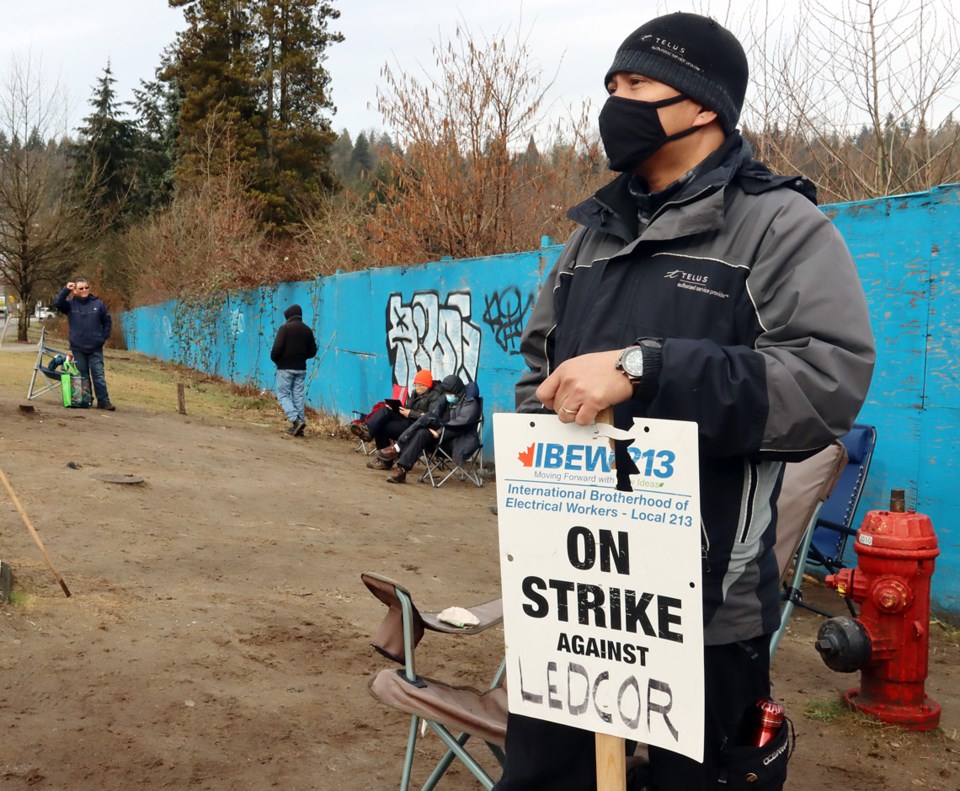A bitter labour dispute that started in 2019 in Port Coquitlam and migrated to Port Moody last year has sparked the latter to review how it deals with protests.
At its meeting Feb. 23, councillors voted unanimously to refund more than $900 in permit fees collected from Local 213 of the International Brotherhood of Electrical Workers that represents dozens of telecommunications workers on strike against their employer, Ledcor.
The dispute began in Sept., 2019, after 31 workers were fired, according to the union. Unionized employees then set up a picket line outside the company’s main offices at the corner of Broadway Street and the Mary Hill Bypass in Port Coquitlam, as well as at another location in Vancouver.
Last October, the company subleased its Port Coquitlam facility and moved to Vintner Road in Port Moody.
Picketers moved with it, setting up signs and chairs on the grass at the corner of Vintner and Clarke Street where they keep a vigil daily.
According to IBEW 213 business representative Dustin Brecht, the union has been charged $917 in highway use permit fees by the city, including a weekly stipend of $67. He said it’s the first time the union has been charged such a fee.
A staff report to council said the fee is normally not required for gatherings along the side of a road that don’t impede the movement of vehicle, pedestrian or cycling traffic. But it was being charged to the union because of a portable washroom that had to be installed on the boulevard for use by the picketers.
Mayor Rob Vagramov said such a fee or any other sort of regulation of protestors or picketers could prove problematic if it’s deemed to be hampering freedom of speech under the Canadian Charter of Rights. “We live in a free country and this sort of stuff shouldn’t be regulated.”
Coun. Meghan Lahti suggested the city could find a way to accommodate people’s right to assemble and protest on public property while also keeping them safe. “If they’re using city property, perhaps we can make suggestions on where they can occur more successfully,” she said. “There’s a difference between saying somebody can’t do something and saying if you’re going to do something this is how you do it.”
In 2018, a group called Culture Guard said it was fined $100 after it carried on with a protest against sexual orientation and gender identity being taught in schools at the Rocky Point Park bandshell despite having its permit revoked and a $187.74 rental fee refunded by the city.
City manager Tim Savoie said at the time once Port Moody learned of the nature of the protest, it deemed it wasn’t an appropriate rental of the park. “Parks are intended to be safe, public places for all to enjoy, and the city of Port Moody does not rent space in public parks for potentially disruptive rallies,” he said.
Kate Zanon, Port Moody’s general manager of community development, told council staff would be open to providing a report on its research into how bylaws can be used to provide guidance for groups wishing to conduct protests. “We’re showing our openness for people to assemble, but at the same time ensure their safety,” she said, adding, “Sometimes assembly does actually require a cost to the city.”
— with files from Diane Strandberg and Stefan Labbé



